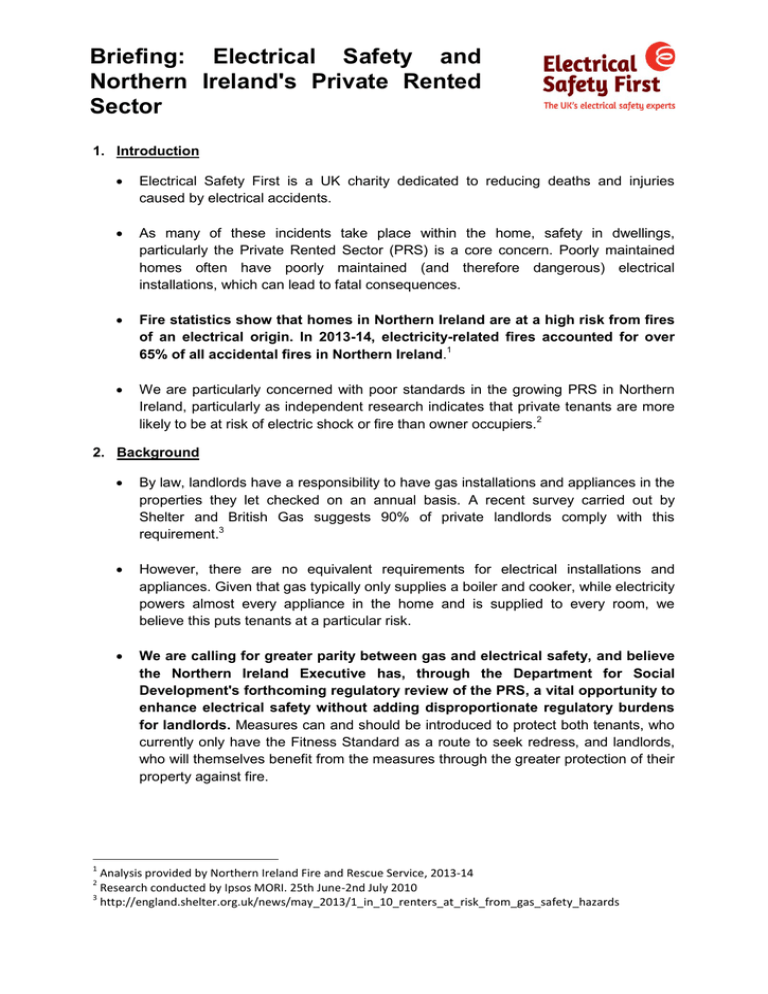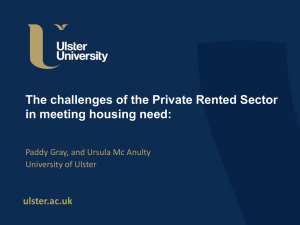Briefing: Electrical Safety and Northern Ireland`s Private Rented Sector
advertisement

Briefing: Electrical Safety and Northern Ireland's Private Rented Sector 1. Introduction Electrical Safety First is a UK charity dedicated to reducing deaths and injuries caused by electrical accidents. As many of these incidents take place within the home, safety in dwellings, particularly the Private Rented Sector (PRS) is a core concern. Poorly maintained homes often have poorly maintained (and therefore dangerous) electrical installations, which can lead to fatal consequences. Fire statistics show that homes in Northern Ireland are at a high risk from fires of an electrical origin. In 2013-14, electricity-related fires accounted for over 65% of all accidental fires in Northern Ireland.1 We are particularly concerned with poor standards in the growing PRS in Northern Ireland, particularly as independent research indicates that private tenants are more likely to be at risk of electric shock or fire than owner occupiers.2 2. Background 1 By law, landlords have a responsibility to have gas installations and appliances in the properties they let checked on an annual basis. A recent survey carried out by Shelter and British Gas suggests 90% of private landlords comply with this requirement.3 However, there are no equivalent requirements for electrical installations and appliances. Given that gas typically only supplies a boiler and cooker, while electricity powers almost every appliance in the home and is supplied to every room, we believe this puts tenants at a particular risk. We are calling for greater parity between gas and electrical safety, and believe the Northern Ireland Executive has, through the Department for Social Development's forthcoming regulatory review of the PRS, a vital opportunity to enhance electrical safety without adding disproportionate regulatory burdens for landlords. Measures can and should be introduced to protect both tenants, who currently only have the Fitness Standard as a route to seek redress, and landlords, who will themselves benefit from the measures through the greater protection of their property against fire. Analysis provided by Northern Ireland Fire and Rescue Service, 2013-14 Research conducted by Ipsos MORI. 25th June-2nd July 2010 3 http://england.shelter.org.uk/news/may_2013/1_in_10_renters_at_risk_from_gas_safety_hazards 2 3. Electrical Safety First key asks for the Northern Ireland Executive Introduce five-yearly safety checks of electrical installations. We propose mandatory five-yearly safety checks by a suitably competent person, along with basic visual checks on change of tenancy. Requirements for regular safety checks currently exist for gas installations and appliances but not electrical installations and appliances. The Gas Safety (Installation and Use) Regulations (Northern Ireland) 2004 specifically deal with the installation, maintenance and use of gas appliances, fittings and flues in domestic properties. The Regulations require landlords to: Ensure an annual safety check is carried out on each gas appliance or flue by a Gas Safe-registered engineer; Ensure gas fittings and flues are maintained in a safe condition, by servicing them in accordance with the manufacturer’s instructions; Keep a record of each safety check for at least two years; Provide new tenants with a record of the most recent safety check, and existing tenants with a record within 28 days of the gas safety check record being completed; Take all reasonable steps to ensure work is carried out, including supplying tenants with a written note requesting access to the property if necessary. Just as gas safety regulations require this annual check to be carried out by a Gas Safe-registered engineer, we believe checks on electrical installations and appliances should be completed by a suitably competent person. Using a member of an accredited registration scheme operated by a recognised body will give some degree of confidence that this has been achieved. Landlords would be required to keep a record of these checks for the full five years after each check, and to provide copies to all existing and new tenants, as appropriate. Visual checks should also be carried out by the landlord or responsible agent on change of tenancy or at least every year, whichever occurs first (Electrical Safety First has developed a checklist to help landlords carry this out). This precautionary regime would serve to significantly reduce the risks to tenant safety arising from faulty electrical equipment but without placing an undue regulatory burden on landlords (estimated costs are £100-£150 every five years). It would also serve to benefit landlords in terms of helping protect their investments. Portable Appliance Testing (PAT) We recommend portable electrical appliances be subject to a combined inspection and test at least every five years, with basic visual safety checks on change of tenancy. Nearly half (48%)4 of Northern Ireland's electrical fires were caused by products including dishwashers, cookers and fridge/freezers - appliances that are routinely provided by landlords along with lets. In addition, recent research undertaken by Electrical Safety First found that 29% of landlords and 40% of tenants did not know who was responsible for ensuring the electrical safety of any appliances supplied with a tenancy.5 Furthermore, the study also showed that 1.7 million private tenants have reported electrical concerns that were either ignored by their landlord or acted on too slowly, and 1.3 million renters are currently waiting for electrical issues to be resolved. We believe these issues highlight a clear imperative for landlords to have their electrical appliances checked on a regular basis, along with their installations. Mandatory fitting of preventative life-saving devices in private rented properties We propose the Northern Ireland Executive take the lead on the installation of preventative safety devices by recommending the installation of RCDs in all PRS properties. RCDs are life-saving devices. They are designed to constantly monitor the electric current flowing along a circuit and almost instantaneously switch off the circuit if an electrical fault is detected. However, despite the fact that recent UK Government data shows that each year 4,000 fires caused by electrical faults in homes (20% in total) might have been prevented if an RCD had been fitted, there are currently no equivalent recommendations for their installation. Electrical Safety First strongly recommends the provision of consumer unit RCDs in the PRS, which could be made a precondition of any new letting. Fitting an RCD into a consumer unit is the most effective way to protect against dangerous electric shocks and reduce the risk of electrical fires. They are relatively low cost, and a requirement for them to be installed would be a cost effective way of improving electrical safety throughout the PRS. Just as we do not believe that mandatory electrical safety checks represent a significant hike in regulatory costs for landlords, we equally believe that this small cost can be absorbed. 4. Contact Details: Wayne Mackay Policy and Public Affairs Advisor, Electrical Safety First Email: wayne.mackay@electricalsafetyfirst.org.uk Tel: 0131 445 4690 4 5 Data based on secondary analysis of Northern Ireland Fire Statistics, 2013-14 Research undertaken between the 17th and 24th May 2013 by Populus on behalf of Electrical Safety First with a sample of 4,093 UK adults. The figures have been weighted and are representative of all UK adults (aged 18+).



